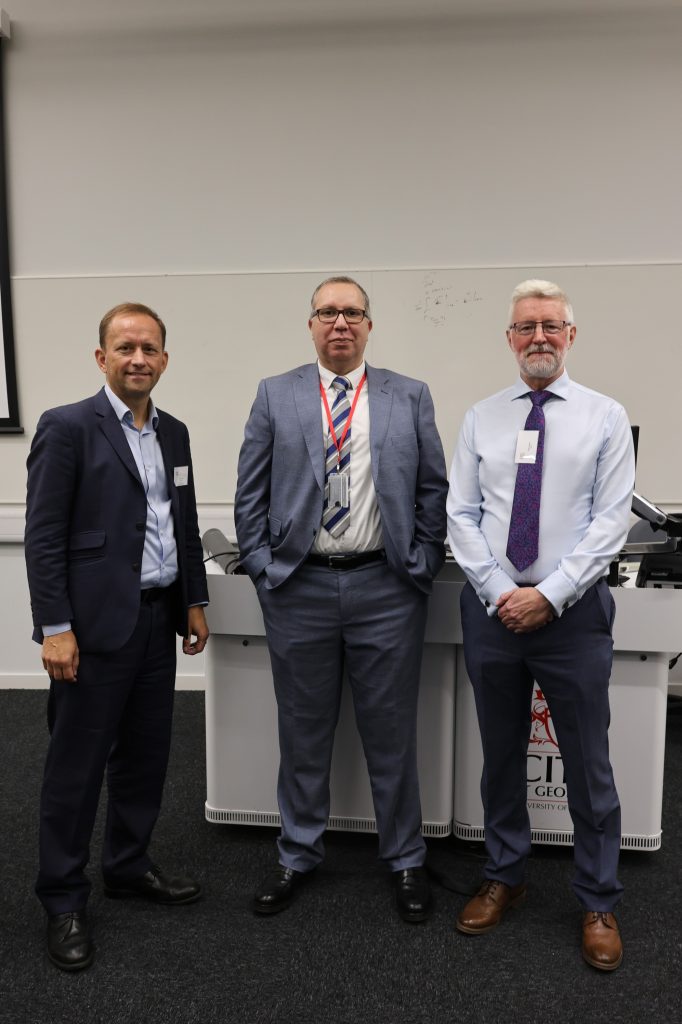Post-Event Report: AI and Data Industry and Roadmap Workshop
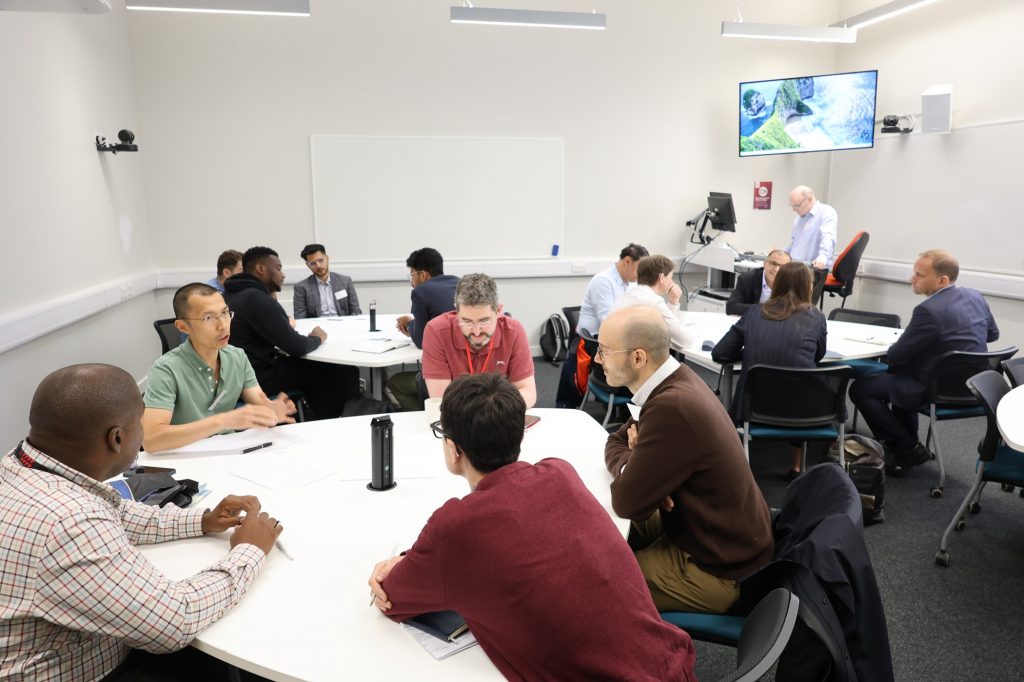
Post-Event Report: AI and Data Industry and Roadmap Workshop
Author: Nabil Aouf (City St George’s, University of London).
The event was organised by the ACE Network’s AI and Data Subgroup led by Nabil Aouf (City St George’s, University of London) and members including Kostas Margellos (University of Oxford), Sean McLoone (Queens University Belfast), Rory Adams (MathWorks), Matthew Carr (Luffy AI), Noah Miller (CarbonRE), Morgan Jones (University of Sheffield), Umberto Montanaro (University of Surrey), James Whidborne (Cranfield University), and Zehor Belkhatir (University of Southampton)
Purpose and Objectives
This workshop offered a comprehensive opportunity for academics at every career stage, industry professionals, and funding organizations to engage in discussions about the vital issues surrounding how academics can tackle the challenges and research inquiries presented by industry within the area of AI and Data theme. Following this, participants provided feedback on creating the ideal roadmap, including potential funding strategies to facilitate this collaboration between industry and academia.
Challenges within the research area that intersects AI and control systems theory were addressed. Participants comprised academics from various disciplines, including Computer Science, Engineering, and Mathematics, alongside industry professionals involved in a range of applications such as defence and security, autonomous systems, AI technologies, manufacturing, and nuclear and energy systems. Specifically, the following technologies and applications were discussed:
• Complex Autonomous Systems – Autonomous and AI based mobility and decision-making in dynamic environments (Healthcare, Manufacturing, Defence and Security, etc.)
• Addressing global challenges such as, climate change, climate engineering
• Potential applications in fusion systems and other high-dimensional control environments.
• Smart Homes: Intelligent automation of energy use, security, and user preferences through adaptive control systems
• Power Systems (National Grid): AI-enhanced control for load balancing, fault detection, and predictive maintenance across large-scale infrastructure.
The participants were requested to specifically pinpoint the research challenges and the optimal methods for investigating how AI advancements can enhance the development of control systems technologies across various applications. In addition, finding effective solutions and addressing the research challenges associated with integrating control systems theory and its diverse optimization algorithms to improve the convergence and accuracy of AI-based techniques were explored.
Participants and Stakeholders
The workshop drew in a total of 57 registered participants, including industry leaders, academics, researchers, and policymakers from funding bodies. Despite the heavy disruption caused by the London Tubes and Trains strikes on the event day, 45 people attended. The varied backgrounds of the audience facilitated engaging discussions from multiple viewpoints. Collaborators and industrial organisations such as MathWorks, JLR, QinetiQ, Siemens, CarbonRE, Luffy AI, UKAEA, among others, along with the significant involvement of Andy Lawrence, Head of Engineering at EPSRC and Bob Hunter, Senior Portfolio Manager at EPSRC, underscore the relevance of the workshop’s main topic for the strategic future of AI and Control systems research and applications. Notable participation in this event is marked by Fulvio Forni, the ACE ECR Group Lead alongside Francesca Boem, the ACE EDI Group Lead.
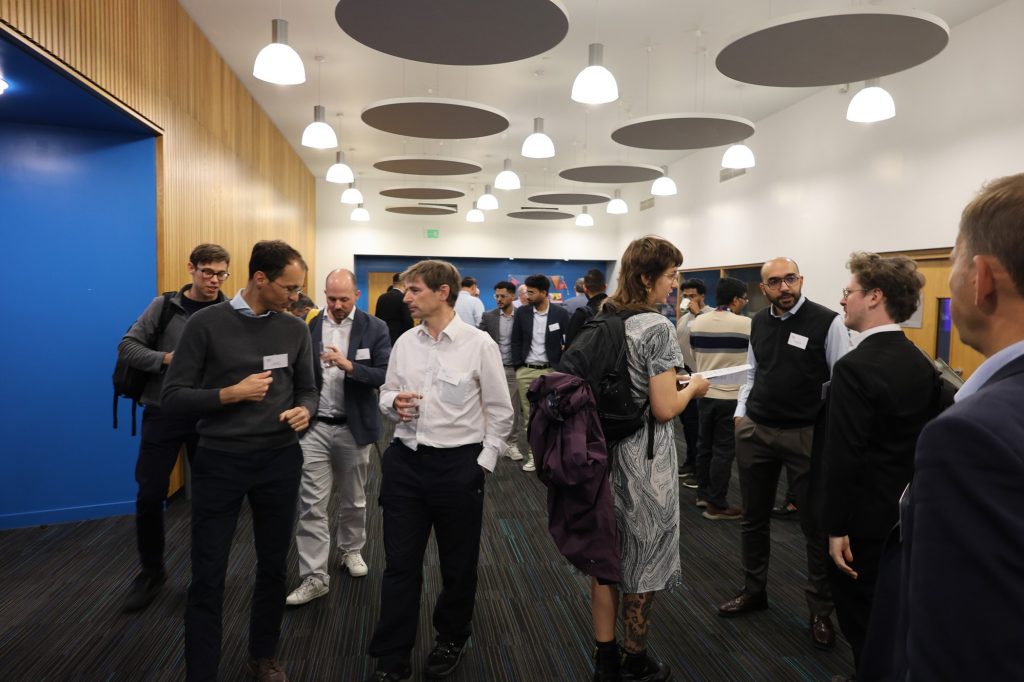
Key Themes and Discussion Highlights
The morning schedule featured an introductory session consisting of technical presentations that highlighted both industry and academic viewpoints on the potential challenges regarding how AI could enhance the development and application of Control Systems, as well as how Control theory could advance AI-based techniques. Subsequently, participants were organised into smaller groups for brainstorming sessions, where they explored the intersection of AI and control systems theory.
The goal was to reach a consensus between academics and industry professionals on a list of key challenges that our AI and Data theme should address. During these brainstorming discussions, the focus was on both AI in Control and Control in AI subtopics, examining the benefits, limitations, and obstacles to improving the synergy between AI and control systems development with questions on the strategic use of AI for control engineering, as outlined below:
• AI should be applied only where traditional and simpler modelling/control solution is insufficient or infeasible.
• AI can “fill in the gaps” between what can be modelled analytically and what cannot, and enhancing system understanding and control.
The brainstorming resumed following the break, focusing on sessions aimed at identifying the key challenges that participants consider crucial for future exploration in the development of the AI and Data GCRC. The identified priorities are:
AI in Control
– Ensuring Safety (with AI in the Loop) e.g. automotive
– Trust in models
– Merging AI models with Dynamical models, old data and new systems
– Lack of appropriate data (scarcity, quality, security, IP)
– Models are not explainable (e.g. Deep Learning)
Control in AI:
– How to embed Physical Properties
– Applying control stability theory to AI training
– Using control to analyse robustness
– Leverage rigour and guarantees
– Using hybrid approach
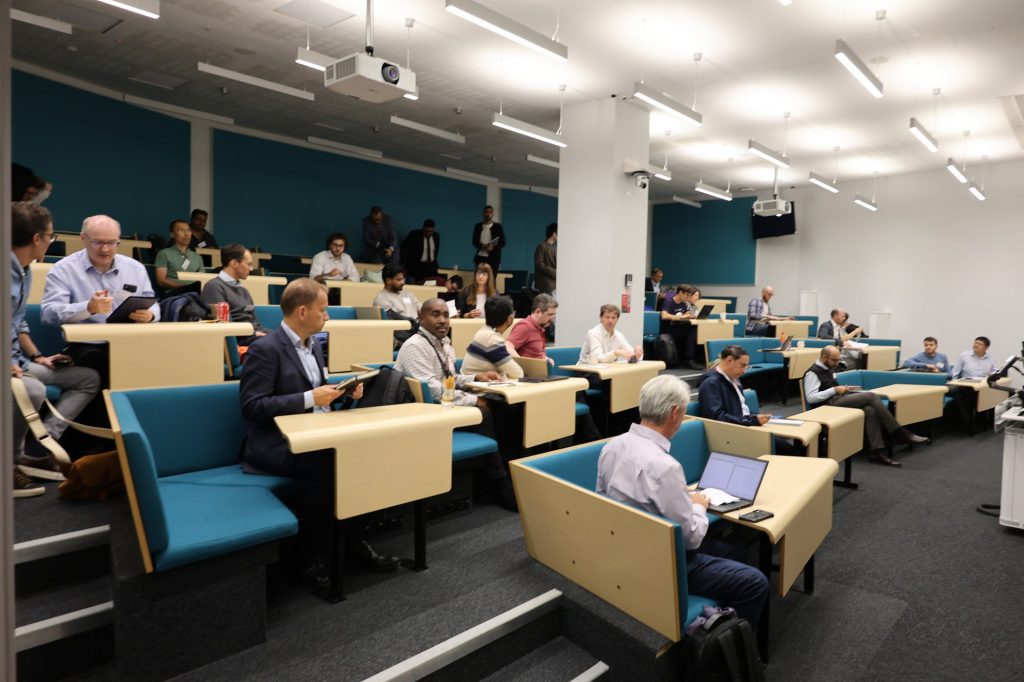
In the afternoon, as part of the roadmap development for the AI and Data GCRC, a panel session was organised that included a diverse group of relevant industry professionals and academics, with the presence of EPSRC. The objectives set for this panel session are outlined as follows:
– Showcase successful partnerships and extract lessons learned
– Identify Key enablers and blockers in academia industry collaboration
– Explore enabling funding mechanisms and roadmap elements.
The panel session was followed by group brainstorming sessions aimed at enhancing the results of the panel discussion and generating concrete outputs to develop a comprehensive and effective roadmap for the AI and Data GCRC.
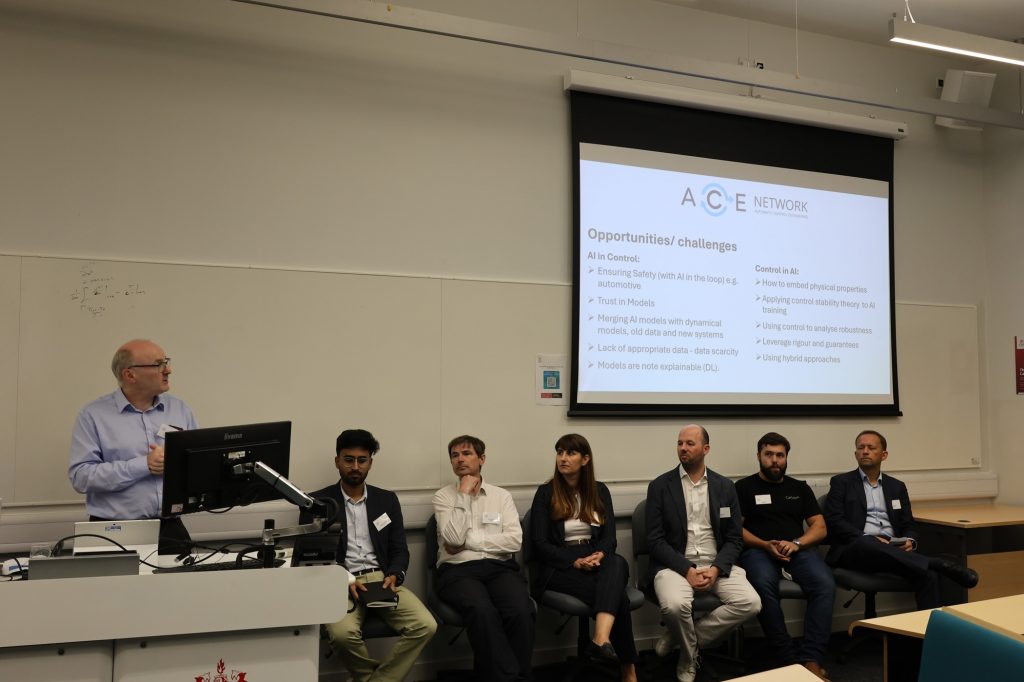
Outputs and Follow-Up Actions
The agreed-upon actions stemming from the afternoon roadmap discussion, taking into account the results of the morning sessions, are outlined as follows:
• Create a grand challenge competition centred on AI in Control and how AI can support or enhance control systems.
• Accelerating Digital Twin Simulation → PINNs for CFD Simulation
• Ensuring the trustworthiness and safety of AI adoption through control systems theory especially in critical applications like healthcare and Defense & Security.
• Curated datasets/models for Control. SIM2REAL testbeds (and complementary datasets)
• Developing frameworks to handle uncertainty in AI-based control systems.
• Adapting robust control techniques for integration with AI architectures.
• Foundational models and architectures for control and RL
• Exploring explainability concepts with AI based control frameworks
• Application area specific sub-groups for e.g. robotics/drones, health, materials, aerospace, process industries. Ideally a couple of industry members present on each. Jointly define and align on prioritised research problems.
• Sandpits Collaborative, exploratory research environments.
• A major challenge is that much of the SOTA in AI is coming from big-spend tech industry players, not academia.
• Academia-Industry → industry problem set driven calls, hackathon.
Funding and Research Landscape as part of the roadmap:
• Explore ARIA as vehicle for driving AI-Control research.
• Develop programs for long-term student engagement in this field – need to nurture a pipeline of talent to work at the AI/Control interface. e.g. like the Power Academy scholarship scheme.
• Science Parks / Technology Parks / Startups
• European Space Agency highlighted as do this well
• Academia to lobby funding agencies to have targeted calls that focus on AI-> Control and Control-> AI.
• Think of 2-3months turnaround research activities that fit smaller grants and some industry immediate needs.
• How to attract top AI researchers (e.g., postdocs) to academia. Strategies could include having Industry Sponsored Chairs in academia in AI in control and facilitating part-time appointments. (i.e. joint industry/academic appointments).
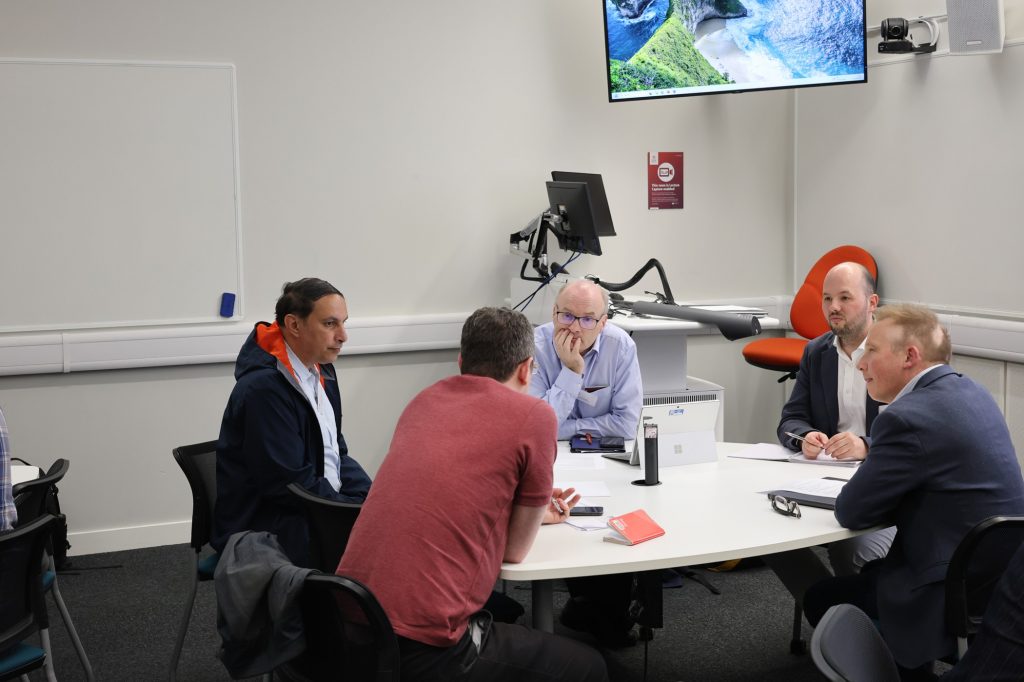
Strategic Relevance and Broader Impact
The significance and wider influence of this workshop are effectively highlighted by the quotes we obtained from Andy Lawrence, Head of Engineering at EPSRC.
Speaking of the importance of the event and the ACE network to the EPSRC:
“I think that for an area like control engineering there are lots of pockets of excellence around the UK. So it’s important to bring everyone together to build the capability and capacity for future research in this area. That’s why the [ACE] network is so good, to bring all those people together from academia, industry and the public sector, like ourselves, to provide that forum for discussion.”
On the AI experts and control systems experts coming together:
“AI is certainly an emerging field, there’s a lot of appetite and enthusiasm in that area. There is still learning around what the opportunities and the applications are of it, and obviously control systems are inherent in a lot of our industries. So bringing those two together enables you to really learn about how to improve control systems, and then how to apply the AI. So there’s mutual benefit there.”
